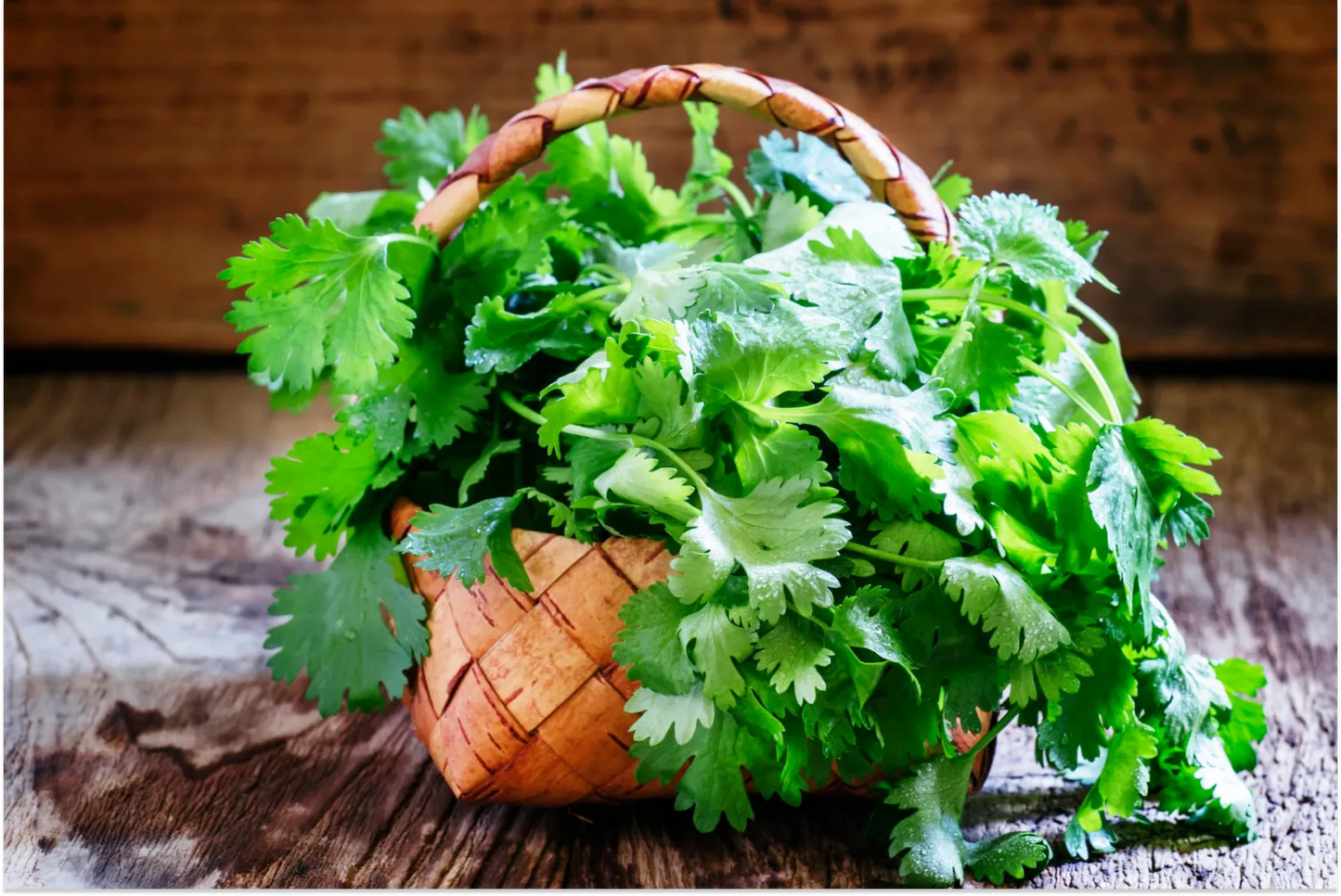
Today, we’re embarking on a flavorful journey into the health-boosting world of cilantro. This vibrant green herb, commonly used as a garnish in many global cuisines, is more than just a culinary seasoning.
Apart from adding a unique zest to our dishes, cilantro is a nutritional powerhouse packed with health benefits. By the time you finish reading this article, you’ll be rushing out to your local grocery to buy fresh cilantro. Let’s get started!
What Is Cilantro?
Defining cilantro is a bit more complicated than you might expect. Depending on where you grew up, you might label cilantro as coriander instead. This can be a bit confusing, so let’s break it down.
The plant in question is known scientifically as Coriandrum sativum. The leaves of this plant are what Americans call cilantro, and the seeds are called coriander.
The word “cilantro” is Spanish and translates to coriander leaves. Since cilantro is a key ingredient in guacamole and other Mexican dishes, its name has been adopted by speakers of American English.
Internationally, it’s a different story — there is no such thing as cilantro in other parts of the world! The majority of other countries refer to the various parts as either coriander seeds or coriander leaves.
To make things even more confusing, cilantro is sometimes referred to as Chinese parsley, as it’s a highly popular herb throughout Asia. However, there are about half a dozen names for this herb in India, depending on the region and language being used.
For today’s purposes, we’ll be using the word “cilantro” to describe coriander leaves.
What Does Cilantro Taste Like?
Whether you know it as cilantro, coriander, or Chinese parsley, the taste remains the same.
The leaves of the cilantro plant have a distinctive, somewhat citrusy flavor. Some people describe it as bright and refreshing, with a slightly peppery tone, while others note a hint of minty freshness. This unique combination of flavors can add a lively, fresh twist to various dishes.
From spicy Indian curries to hearty South American soups to Chinese tiger salads, cilantro has found its way into the hearts and dishes of so many around the world. It’s a testament to the herb’s versatility and unique flavor that it’s used in such diverse cuisines.
What Is the Nutritional Value of Cilantro?
While this superfood may be low in calories, don’t let that fool you — it’s brimming with vitamins, minerals, and other health-supporting compounds.
Here’s a quick breakdown:
- Vitamin A: Cilantro is a good source of vitamin A, which supports eye health and bolsters the immune system. It also helps the heart, lungs, and kidneys to function properly.
- Vitamin C: This vitamin is a powerful antioxidant that helps protect our bodies from free radicals. It also supports the immune system and is essential for the production of collagen.
- Vitamin K: Another vitamin found in cilantro is vitamin K, which is essential for blood clotting and supporting bone health.
- Folate: Also known as vitamin B9, folate is crucial for proper brain function and plays an important role in mental and emotional health.
- Potassium: This mineral is critical for heart health, as it helps regulate blood pressure and fluid balance.
- Magnesium: Magnesium is essential for many processes in the body, including regulating muscle and nerve function, blood sugar levels, and blood pressure.
- Manganese: This trace mineral is essential for the metabolism of carbohydrates, amino acids, and cholesterol. It’s also involved in bone formation and soothing tension.
In addition to these nutrients, cilantro is also packed with antioxidants and flavonoids. These highly beneficial compounds can help to protect your cells against damage caused by oxidative stress and free radicals.
What Are the Health Benefits of Cilantro?
Now that we’ve covered the basics of cilantro, let’s get into the details of why you might want to start adding it to more of your meals. Here’s a breakdown of all the health benefits of cilantro.
1. Supports Digestion
Cilantro is known to stimulate the production of digestive enzymes. These enzymes play a crucial role in breaking down the food we eat, helping our bodies absorb the nutrients more efficiently. This can lead to a healthier and more comfortable digestion process.
2. Bolsters Skin Health
Thanks to its antioxidant properties, cilantro can be beneficial for your skin. Antioxidants help to combat the damage caused by free radicals, which can lead to signs of aging and skin irritations. Regularly consuming cilantro could help maintain your skin’s elasticity, giving it a youthful and healthy appearance.
3. Encourages Healthy Blood Sugar Levels
Some studies suggest that cilantro may help lower blood sugar levels. Although more research is needed to make any concrete conclusion, the initial findings are promising.
4. Supports Heart Health
Cilantro may help maintain healthy cholesterol levels and blood pressure, which are two key factors for heart health. With heart disease being a major concern worldwide, including heart-friendly foods like cilantro in your diet is a step in the right direction toward maintaining a healthy heart.
5. Provides Sleep Support
The natural sedative effect of cilantro can aid in improving sleep quality. If you’ve been having trouble sleeping, a sprinkle of cilantro in your dinner could potentially lead to a more restful night’s sleep.
6. Bolsters Joint Health
With its analgesic properties, cilantro has been found to help soothe joint pain in animal studies. If you’re someone who experiences joint discomfort, adding cilantro to your meals could provide some relief. It’s a natural way to support your joint health and maintain your mobility and comfort.
7. Encourages Fresh Breath
Chewing on cilantro leaves can help freshen your breath. So, next time you’re preparing for a social event or a meeting, consider chewing on some cilantro leaves for a quick and natural breath freshener.
8. Supports the Immune System
The impressive antioxidant profile of cilantro, which includes potent compounds like quercetin, can provide solid support to your immune system. Remember, a robust immune system is your body’s first line of defense against various illnesses. A little bit of cilantro could go a long way toward supporting your immunity.
9. Encourages Bone Health
When it comes to maintaining bone health, one nutrient stands out — vitamin K. This essential vitamin aids with the absorption of calcium, a key component of our bones. Who knew adding cilantro to your daily lineup could lead to stronger and healthier bones?
10. Supports a Balanced Mood
Feeling a little off-kilter? Cilantro might just be the herb you need. Some studies suggest that cilantro can have a calming effect on the nervous system, helping to foster a more balanced mood.
11. Helps With Weight Management
If you’re on a weight loss journey, cilantro can help. This herb is low in carbohydrates and can add a burst of flavor to your meals without tacking on extra calories. It’s a delicious and guilt-free way to keep your taste buds satisfied while staying on track with your weight management goals.
12. Bolsters Eye Health
Cilantro is a sight for sore eyes — literally! This humble herb is rich in carotene and vitamin A, both of which are known to support eye health. These nutrients can help protect against age-related eye conditions, helping you maintain good vision as you age.
13. Provides Detoxing Benefits
Cilantro can even support your body’s natural detoxification processes. This herb has a unique ability to bind with heavy metals in the body, supporting their removal. It’s a natural and tasty way to help keep your system clean and functioning optimally.
14. Supports Hair Health
Cilantro isn’t just for eating — it can also be a great addition to your hair care routine. You can make homemade hair products by grinding up cilantro into a paste. Just apply it to your scalp for a natural condition that can help strengthen the hair and add a lustrous shine.
How Can You Incorporate Cilantro in Your Diet?
The easiest answer to this question is to use cilantro supplements or essential oils made from cilantro extract. But where’s the fun in that? Instead, check out some of my favorite recipes that feature a healthy dose of your new favorite herb.
Salmon Tacos With Cabbage Slaw and Creamy Cilantro Dressing
This is a flavorful dish that’s easy to make and even easier to enjoy. The rich salmon is beautifully contrasted with a vibrant cabbage slaw, all wrapped up in a grain-free taco shell.
For the cabbage salad with creamy cilantro dressing, you’ll need:
- ½ cup extra-virgin olive oil
- 1 avocado
- 1 very coarsely chopped bunch of fresh cilantro
- 1 garlic clove
- 3 tablespoons of lime juice
- ½ teaspoon ground coriander
- ½ teaspoon Himalayan salt
- 3 cups of very thinly sliced Napa cabbage
- 1 diced red bell pepper diced
For the salmon, you’ll need:
- Avocado oil pan spray
- 1 pound salmon filet
- ½ teaspoon Himalayan salt
- ¼ teaspoon ground black pepper
To complete the dish, you’ll need:
- 8 grain-free taco shells
- Optional garnishes such as diced tomatoes, salsa fresca, or sliced jalapeno peppers
Here’s how to make it:
- Blend olive oil, avocado, cilantro, garlic, lime juice, coriander, and salt in a food processor until combined.
- Toss the cabbage and red bell pepper with the dressing and refrigerate.
- Broil the salmon for about five to eight minutes. Make sure it’s done to prevent food poisoning or salmonella.
- Warm the taco shells, flake the salmon, and divide it among the tacos, topping with the cabbage slaw and your optional garnishes.
Chermoula Bowl
This is a flavorful dish featuring a fresh herb sauce with a Middle Eastern twist. Once you try it, it’s sure to be a staple in your weekly rotation!
The sauce, known as Chermoula, is made using:
- ½ cup fresh cilantro
- ½ cup fresh parsley
- 1 tablespoon of fresh lemon juice
- 1 tablespoon extra virgin olive oil
- 1 small finely grated garlic clove
- ½ teaspoon finely grated lemon zest
- ½ teaspoon ground cumin
- ½ teaspoon paprika
- A pinch of cayenne
- ⅛ teaspoon of Celtic or Pink Himalayan salt
*Adding one to two tablespoons of water can thin the sauce if it’s too thick for your taste
The bowl requires:
- At least one cup of cauliflower rice
- 2 cups loosely packed baby spinach
- 2 roasted plum tomatoes*
- 4 to six ounces grilled beef, lamb, chicken, shrimp, or fish.
*Roasted tomatoes can be store-bought. Or, you can make your own by baking halved Roma tomatoes at 375ºF for about 40 minutes, then increasing the heat to 400ºF for an additional 20 minutes until caramelized.
To prepare this delectable dish:
- Blend the sauce ingredients into a coarse paste.
- Combine the cauliflower rice and spinach with half of the sauce.
- Warm the mix in the microwave for two to three minutes.
- Top with roasted tomatoes, grilled meat, and the remaining sauce.
Southwestern Salmon With Cilantro Pesto
This delicious dinner combines the richness of salmon with the zesty flavor of cilantro pesto. The recipe serves four and requires a food processor for the pesto preparation.
For the salmon, you’ll need:
- 4 salmon steaks or filets (each four to six ounces)
- Coconut oil spray
- 2 tablespoons of freshly squeezed lime juice
- ½ teaspoon each of smoked paprika and cumin
- ¼ teaspoon of garlic powder
- ½ teaspoon of sea salt
- ¼ teaspoon of black pepper
- A dash of cayenne
- 4 teaspoons of maple syrup or raw honey
The cilantro pesto calls for:
- ½ cup of toasted raw sliced almonds
- 2 cups of lightly packed cilantro leaves
- 2 tablespoons of freshly squeezed lime juice
- 1 to two cloves of garlic
- 2 tablespoons of extra virgin olive oil
- ½ teaspoon of salt
- ¼ teaspoon of pepper
- 1/8 teaspoon of hot sauce
For the cilantro pesto:
- Process the almonds until they are almost powdery.
- Add the cilantro leaves, lime juice, and garlic and continue to process until the cilantro is well chopped.
- With the motor running, add the olive oil, salt, pepper, and hot sauce, then taste and adjust the seasonings.
- Store the pesto covered in the refrigerator.
To prepare this delicious dish:
- Preheat the broiler to high and position the rack six inches below the heat source.
- Line a sheet pan with aluminum foil and spray the foil with coconut oil.
- Place the salmon on the baking sheet and pour lime juice over it.
- Mix all spices and seasonings in a small bowl and sprinkle evenly on the fish.
- Spray the top of the fish lightly with coconut oil.
- Broil the fish for five to eight minutes, depending on its thickness.
- Near the end of the broiling time, remove the fish from the oven, drizzle with maple syrup or honey, and broil for another one to two minutes.
- Top the fish with the refrigerated pesto and a fresh slice of lime before serving.
The Takeaway
Cilantro is more than just a flavorful herb — it’s a wellness powerhouse packed with beneficial nutrients. The health benefits alone make this herb well worth incorporating into your daily routine. But once you’ve tasted its unique flavor, you’ll be adding it to everything that you can!
Sprinkle a little cilantro into your morning bone broth, or check out our blog for more recipes that feature this incredible herb. Remember that your health is in your hands, and every step, no matter how small, is a step towards a healthier you.
Sources:
Coriandrum sativum L.: A Review on Ethnopharmacology, Phytochemistry, and Cardiovascular Benefits | PMC
Coriander Leaf Extract Exerts Antioxidant Activity and Protects Against UVB-Induced Photoaging of Skin by Regulation of Procollagen Type I and MMP-1 Expression | PMC
Effect of Coriander Plants on Human Emotions, Brain Electrophysiology, and Salivary Secretion | PMC
Sedative Effect of Central Administration of Coriandrum sativum Essential Oil and Its Major Component Linalool in Neonatal Chicks | NCBI Bookshelf
Insulin-Releasing and Insulin-Like Activity of the Traditional Anti-Diabetic Plant Coriandrum sativum (Coriander) | PubMed
Evaluation of Disease Modifying Activity of Coriandrum sativum in Experimental Models | PMC
Quercetin, Inflammation and Immunity | PMC
Chelation: Harnessing and Enhancing Heavy Metal Detoxification—A Review | PMC
A Mechanistic Review of β-Carotene, Lutein, and Zeaxanthin in Eye Health and Disease | PubMed
The Medical Benefits of Vitamin K2 on Calcium-Related Disorders | PMC
Synergistic Effect of Probiotic, Chicory Root Powder and Coriander Seed Powder on Growth Performance, Antioxidant Activity and Gut Health of Broiler Chickens | PMC
Cilantro vs Coriander: Is There a Difference? | Spoon University





